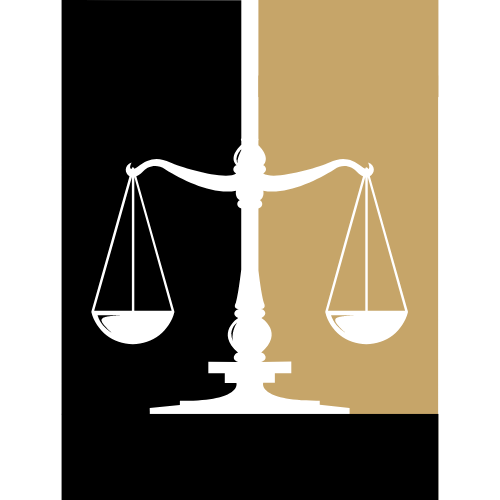Did you know Morocco handles over 100,000 divorce cases every year? This shows how big of an issue marriage dissolution is in the country. Understanding the cultural, religious, and legal sides of divorce in Morocco is key for those going through it.
Key Takeaways
- Moroccan law governs the dissolution of marriages, with a focus on cultural and religious contexts.
- Key principles and legislation, such as the Moroccan Family Code, guide the grounds for divorce, child custody rights, and financial arrangements.
- The judicial process for divorce in Morocco includes filing, court proceedings, and potential mediation and reconciliation efforts.
- Islamic marital jurisprudence and the Moroccan Family Code shape the legal landscape for marriage dissolution.
- Protecting the rights of women and children is a crucial consideration in Moroccan divorce cases.
Understanding Marriage Dissolution in Moroccan Law
To understand marriage dissolution in Moroccan law, we need to look at the cultural and religious backgrounds. Morocco’s laws are deeply influenced by Islamic rules, as seen in the Moroccan Family Code. This code covers many aspects of family life.
Cultural and Religious Contexts
Moroccan society is deeply rooted in Islamic traditions. Marriage dissolution is no different. The cultural and religious norms of Moroccan families shape the legal side of ending marriages. It’s important to grasp these nuances to navigate the complexities of marriage dissolution in Moroccan law.
Key Principles and Legislation
The Moroccan Family Code is the main law for marriage dissolution. It outlines the key principles and guidelines for ending marriages. These rules come from Islamic marital jurisprudence. Knowing these core tenets helps us understand the legal side of ending marriages in Morocco.
“The Moroccan Family Code is a testament to the country’s commitment to upholding the rights and well-being of its citizens, particularly in the realm of family law.”
Marriage Dissolution in Moroccan Law
Understanding how to end a marriage in Moroccan law can be tough. But knowing the legal ways to dissolve a marriage is key. We’ll explore the different methods to end a marriage under Moroccan laws.
The Moroccan Family Code, or Moudawana, sets the rules for ending a marriage. It outlines the reasons and steps for divorce, annulment, and other ways to end a marriage. In Morocco, couples have several choices to end their marriage, each with its own rules and effects.
| Type of Marriage Dissolution | Description |
|---|---|
| Divorce (Talaq) | A unilateral decision by the husband to end the marriage, which must be approved by a judge. |
| Judicial Divorce (Khul’a) | A divorce initiated by the wife, which requires her to forfeit financial rights and return the dowry. |
| Mutual Divorce (Mubara’at) | A divorce agreed upon by both spouses, where they mutually consent to end the marriage. |
| Annulment (Faskh) | A legal process that declares a marriage null and void, typically due to a violation of the Moudawana. |
The divorce process in Moroccan law depends on the reason for ending the marriage. Couples must follow the right legal steps, which might include mediation, filing for divorce, and appearing before a judge. The court makes sure both parties’ rights are respected and that any children are taken care of.
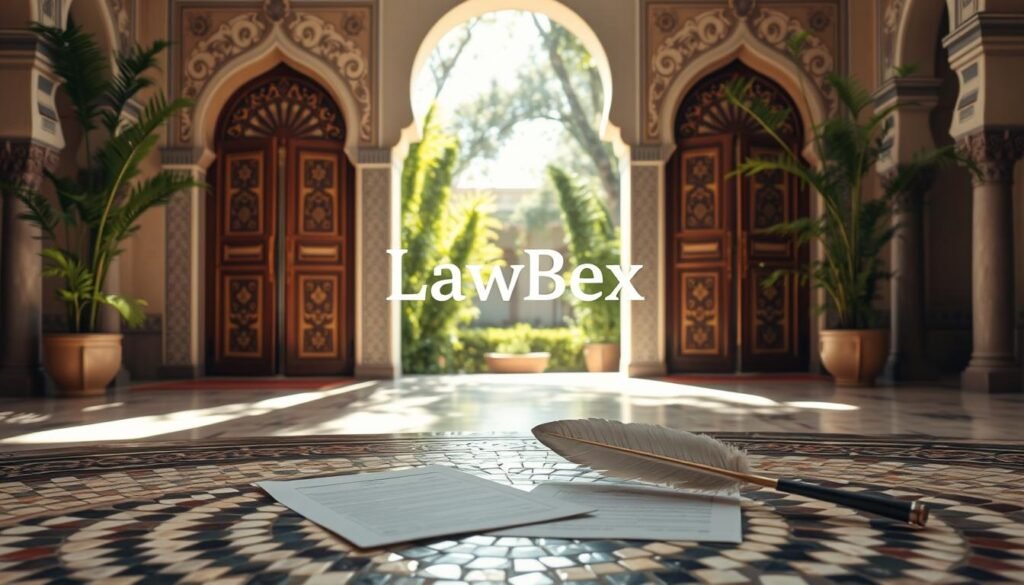
It’s important to understand the details of ending a marriage in Moroccan law. By knowing the options and what’s needed, people can make good choices. This helps them move smoothly into a new chapter of their lives.
Grounds for Divorce in Morocco
In Morocco, there are clear rules for getting a divorce. You can choose from fault-based or no-fault options. Knowing these rules is key for those going through a divorce.
Fault-Based Grounds
Moroccan law lists several reasons for a fault-based divorce. These include:
- Irreconcilable differences between the spouses
- Abandonment of the marital home for more than one year
- Abuse or mistreatment of the spouse
- Failure to provide financial support or maintenance
- Incurable mental illness or disability
No-Fault Grounds
Morocco also allows for no-fault divorces in some cases. These include:
- Mutual consent of the spouses to dissolve the marriage
- Irreconcilable differences that have led to a breakdown of the marriage
- The passage of a specified period of time (typically one year) since the spouses have been living apart
Choosing between fault-based or no-fault grounds affects the divorce process. It impacts asset division, alimony, and child custody. Getting legal advice is important for a fair outcome.
| Fault-Based Grounds | No-Fault Grounds |
|---|---|
| Irreconcilable differences | Mutual consent |
| Abandonment | Irreconcilable breakdown of marriage |
| Abuse or mistreatment | Separation for a specified period |
| Failure to provide financial support | |
| Incurable mental illness or disability |
“Understanding the legal grounds for divorce is crucial for individuals navigating the process of marriage dissolution in Morocco.”
Child Custody Rights and Arrangements
When a marriage ends in Morocco, child custody is a key issue. Both mothers and fathers have important rights and duties. Moroccan law focuses on keeping children safe and happy after a divorce.
Maternal Custody and Paternal Visitation
In Morocco, the mother usually gets custody of the kids first. This is because the law believes a mother’s care is vital for a child’s growth. But, fathers still have the right to see their kids and help raise them.
The courts decide on custody and visitation based on what’s best for the child. They look at the child’s age, gender, and emotional needs. This ensures the child’s happiness is the top priority.
| Custody Arrangement | Description |
|---|---|
| Maternal Custody | The mother is granted primary custody of the children, with the father maintaining visitation rights. |
| Paternal Custody | In exceptional cases, the father may be granted primary custody, with the mother retaining visitation rights. |
| Joint Custody | In some instances, the courts may order joint custody, where both parents share responsibility for the children. |
It’s important to follow these custody rules. They help protect the rights and happiness of both kids and parents in Morocco.

Property Division and Financial Settlements
When a marriage ends in Morocco, dividing property and financial duties is key. Legal rules help make sure assets and debts are split fairly. This ensures a just outcome during the divorce.
The Moroccan legal system follows the community property rule. This means that things bought during the marriage belong to both spouses. This includes homes, investments, and bank accounts. Usually, these are split 50/50, unless there’s a good reason to do otherwise.
The court might also order one spouse to pay the other alimony. This is based on the recipient’s needs, the payer’s ability, and their marriage lifestyle.
- Equitable distribution of marital assets
- Allocation of shared debts and liabilities
- Determination of alimony and spousal support
- Consideration of the unique financial circumstances of each case
- Ensuring a fair and balanced outcome for both parties
The property division and financial settlements in Moroccan divorces are complex. It’s crucial for couples to get help from skilled lawyers. They can guide through these legal and financial challenges.
“The goal of property division and financial settlements in Moroccan divorce cases is to achieve a fair and equitable outcome for both parties, taking into account the unique circumstances of each situation.”
Alimony Payments and Spousal Support
Alimony, or spousal support, is key in ending a marriage in Morocco. This part explains how alimony is decided, including what factors are looked at. It also talks about how long alimony lasts and when it stops. Knowing about alimony is important for both sides in a divorce.
Determining Alimony Obligations
The Moroccan law looks at many things to decide on alimony. These include the financial needs of the person getting alimony, how much the person paying can afford, how long they were married, and their lifestyle during the marriage. The goal is to help the financially weaker spouse keep a similar lifestyle after the divorce.
Duration and Termination of Alimony
Alimony in Morocco usually lasts for a certain time, based on how long the couple was married. Sometimes, it can go on forever if the person getting it can’t support themselves. Alimony stops when the person getting it remarries, moves in with someone new, or becomes financially stable on their own.
| Alimony Payments | Spousal Support | Alimony Obligations | Alimony Duration |
|---|---|---|---|
| Alimony is a monthly or lump-sum payment made by one spouse to the other after a divorce. | Spousal support is the financial assistance provided by one spouse to the other during or after a divorce. | Alimony obligations are determined by the court based on factors like financial need, ability to pay, and the standard of living during the marriage. | Alimony duration can be for a specific period or indefinite, depending on the circumstances of the case. |
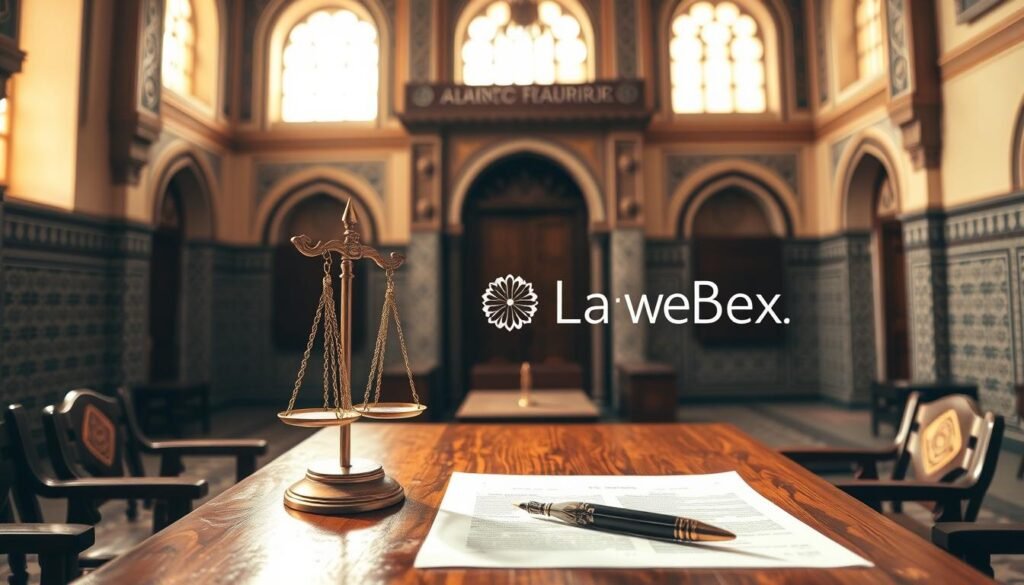
“Alimony payments are essential in ensuring that the financially weaker spouse is able to maintain a similar standard of living after a divorce.”
Divorce Procedures and Judicial Processes
Going through the legal steps of a divorce in Morocco is key. Knowing how to file for divorce, what documents you need, and what happens in court is important. It helps people handle the end of their marriage better.
Filing for Divorce and Court Proceedings
The first step in a Moroccan divorce is filing a divorce petition. This petition needs documents like the marriage certificate, proof of where you live, and financial info. After filing, the court sets a hearing to look into the case and decide why the divorce is needed.
In court, both sides can share their side of the story and evidence. The judge then decides on the divorce reasons, child care, money matters, and who gets what property.
| Divorce Procedure | Description |
|---|---|
| Filing the Petition | The divorce process starts with a petition for divorce, which needs several documents. |
| Court Hearing | The court holds a hearing to review the case and decide on the divorce grounds. |
| Judicial Ruling | The judge makes a decision on the divorce reasons, child care, money, and property division. |
It’s vital to know the divorce steps and court processes in Morocco. Being informed helps couples going through a divorce. It prepares them for the court’s complexities.
Islamic Marital Jurisprudence and the Moroccan Family Code
Moroccan family law is deeply rooted in Islamic marital jurisprudence and the Moroccan Family Code. This legal framework shows the country’s rich cultural and religious heritage. It provides a detailed approach to ending marriages.
The Moroccan Family Code is based on Islamic law’s core principles. These principles highlight the importance of marriage and family values. The code outlines the grounds for divorce, the rights and duties of spouses, and how to handle child custody and financial settlements.
Principles of Islamic Marital Jurisprudence
- The concept of mahr, a dower or bridal gift, which ensures the wife’s financial security
- The principle of qiwamah, which emphasizes the husband’s duty to protect and provide for the family
- The notion of nafaqah, the husband’s duty to financially support his wife and children
- The recognition of various divorce forms, like talaq (repudiation), khul’ (mutual consent), and faskh (judicial dissolution)
These Islamic principles are integrated into the Moroccan Family Code. They shape the country’s view on ending marriages and the rights of spouses and children. The [legal analysis] shows how religious and civil law work together in Morocco. It offers insights for legal professionals and scholars.
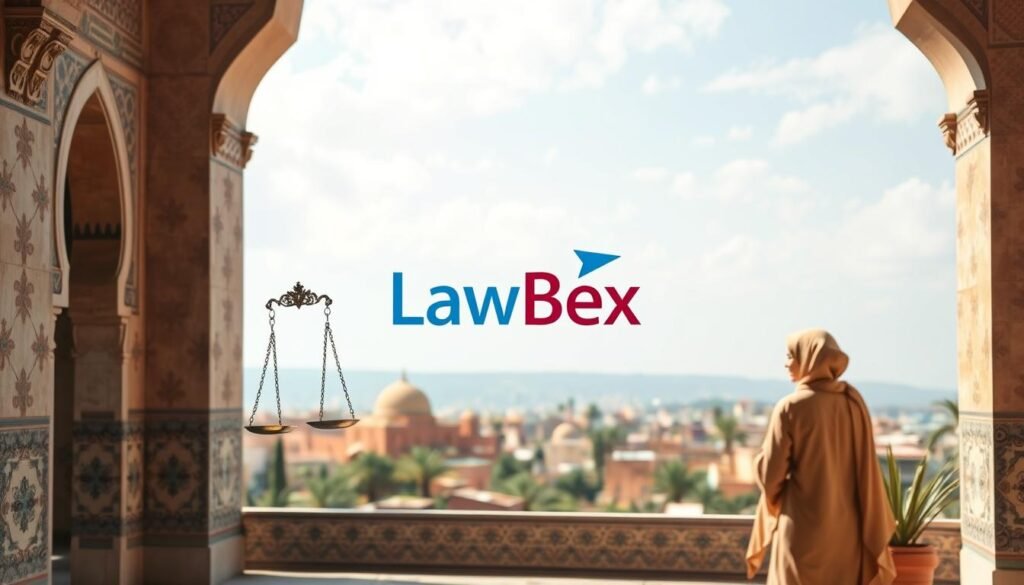
“The Moroccan Family Code represents a unique fusion of Islamic and civil law, reflecting the country’s commitment to preserving its cultural and religious identity while adapting to the evolving needs of modern society.”
Mediation and Reconciliation Efforts
In Moroccan law, mediation and reconciliation are key before and during divorce. These efforts help couples deal with the end of their marriage. They aim to find solutions that both sides can agree on.
Family mediation is very important in divorce cases. It helps couples understand each other better. It also protects the rights of everyone involved.
The Role of Family Mediation in Divorce Cases
Family mediation is a private process where couples talk about their issues. Trained mediators help them find solutions that work for everyone. This is especially important for families with children.
Mediation is great for Moroccan divorce cases. It promotes talking openly and working together. This helps keep family ties strong.
By finding common ground, couples can avoid the stress of court battles. They can work out things like child custody and money matters together.
Mediation also opens the door to reconciliation. This fits well with Moroccan culture and values. It’s about keeping the family together and solving problems peacefully.
“Mediation and reconciliation efforts are at the heart of Moroccan divorce law, reflecting the country’s commitment to upholding family values and protecting the rights of all parties involved.”
By focusing on mediation and reconciliation, Moroccan divorce law offers a better way to end a marriage. It respects the cultural and religious values that shape families in Morocco.
Protecting the Rights of Women and Children
In Morocco, the law focuses on keeping women and children safe during divorce. The Moroccan Family Code, or Moudawana, has rules to protect them.
The code gives mothers custody of children unless it’s not best for the child. This rule helps keep families stable until kids grow up.
Also, fathers must pay for child support. This includes housing and keeping the child’s standard of living after divorce. It makes sure kids’ needs are met, no matter if their parents are divorced.
Women also get special help in divorce. They can get compensation and help with housing costs during the ‘Idda’ period. This helps women financially during a big change in their life.
The Moroccan Family Code shows a strong commitment to family and justice. It does this even when marriages end.
| Women’s Rights | Children’s Rights |
|---|---|
| Consolation compensation | Maternal custody rights |
| Housing expenses during Idda period | Paternal financial responsibility for child support |
The law in Morocco makes sure women’s rights and children’s rights are protected during divorce. It ensures they get the support they need.
“The Moroccan Family Code places a strong emphasis on safeguarding the well-being and interests of women and children, even in the face of marital breakdown.”
Cross-Cultural Considerations and International Family Law
When dealing with divorce in Morocco, it’s important to think about cultural differences and international law. This is especially true for people with ties to other countries or cultures. The legal process can be very complex.
Understanding how Moroccan law works with laws from other countries is a big challenge. Divorce and child custody cases often involve more than one country. It’s crucial to know how to handle court orders across borders.
Cultural differences also play a big role in divorce. Things like religious beliefs, gender roles, and family values can shape how people see the divorce. Being open and understanding is key to finding a fair solution.
It’s wise to get help from lawyers who know both Moroccan and international family law. They can offer valuable advice and support. This helps protect everyone’s rights in the legal process.
“Navigating the complexities of cross-cultural divorce requires a deep understanding of both local and international legal frameworks, as well as a commitment to cultural sensitivity and open communication.”
By grasping the connection between Moroccan law and international law, and being culturally aware, people can handle divorce better. This is especially true in today’s global world.
Common Challenges and Pitfalls to Avoid
Dealing with divorce in Morocco can be tough. It involves understanding the law and protecting your rights. Without the right lawyer, it can feel overwhelming.
Legal Complexities and Representation
The laws on divorce in Morocco are complex. Things like child custody, alimony, and dividing property are tricky. You need to know the laws well.
Getting help from a good lawyer is key. They know the law and can help you. They make sure your rights are looked after and you get a fair deal.
Without a lawyer, you might run into problems. These include missing important deadlines, not getting the right custody, or losing out on money matters. Delays can also happen.
- Overlooking critical deadlines or procedural requirements
- Failing to secure the appropriate custody arrangements for their children
- Experiencing unfavorable rulings on financial matters like alimony and property division
- Encountering delays or complications in the divorce proceedings
With a good legal team, you can face divorce in Morocco with more confidence. You’re more likely to get a good outcome.
“Navigating the legal complexities of divorce in Morocco requires the expertise of a skilled attorney who can ensure your rights are protected throughout the process.”
Resources and Support for Divorcing Couples
Divorce in Morocco can be tough for many couples. But, there are many resources and support systems to help. These can make the process easier.
Getting legal help is key. A good family law attorney can explain your rights and the legal steps. They make sure your interests are looked after. Many places offer free or low-cost legal help for those who can’t pay.
- It’s also important to get emotional support. Divorce can be very hard on your feelings. In Morocco, there are groups and services that offer counseling and support. They help with the emotional side of divorce.
- Mediation is another good option. It helps couples find a fair agreement without going to court. Trained mediators help with the talks, leading to a peaceful solution.
Using these resources, divorcing couples in Morocco can face their challenges better. They can take care of themselves and their families during this tough time.
“Divorce can be a difficult journey, but with the right support and resources, it is possible to emerge from it with dignity and a renewed sense of purpose.”
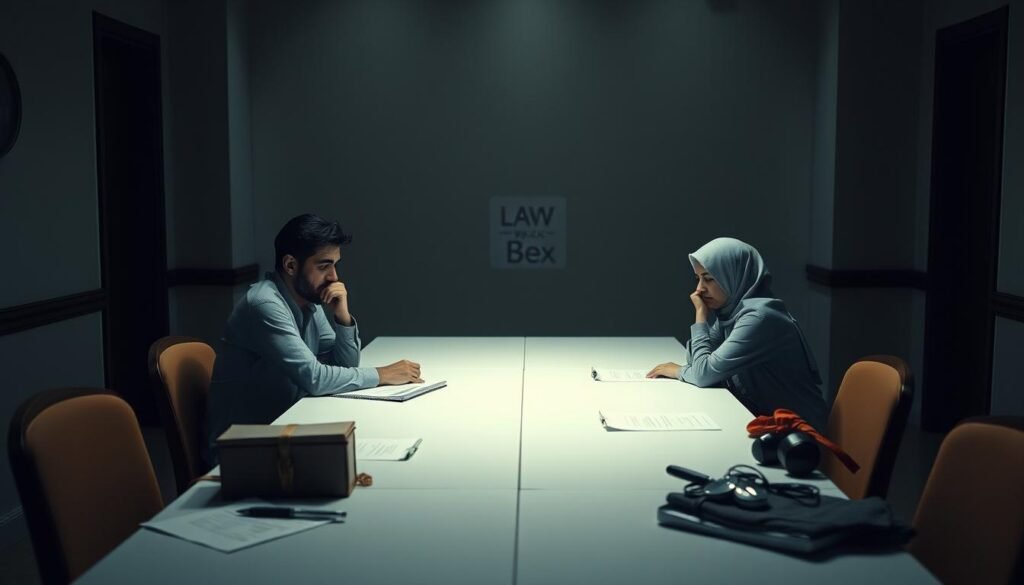
FAMILY LAW BASICS: UNDERSTANDING LEGAL MATTERS
Conclusion
In this article, we explored the complex world of divorce under Moroccan law. We looked at the cultural and religious backgrounds and the legal basics. This gives a clear view of the legal landscape.
We discussed the main points of divorce, like child custody, property, and money matters. We also talked about the importance of mediation and protecting women and children’s rights. These are key to a fair divorce.
Knowing the Moroccan Family Code and Islamic laws helps couples prepare for divorce. Understanding cultural differences and getting legal advice is also crucial. Our main points are to be proactive, seek help, and care for everyone involved.
